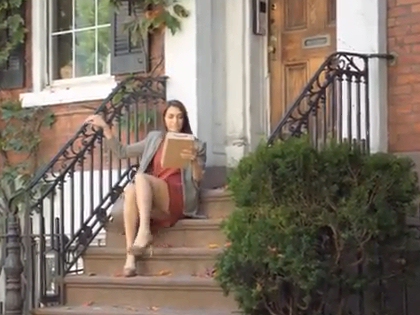
It’s hard to keep up! While we’re waiting to see if Amazon’s going to announce some new Kindles, they’ve already quietly announced some other very big initiatives. There’s some good news for students, plus an interesting experiment that improves the way packages get delivered. And this week, Amazon even announced an exciting new feature for current Kindles!
Basically, Amazon’s created an extension for the Chrome web browser that lets you grab a copy of any page off of the web, and then have it sent to your Kindle! The content can even be sent to your Kindle apps, so you could also read those Kindle-ized web pages on your smartphone or tablet. And you don’t even have to send the whole web page — you can also just select part of the text. “We send just the content you want and not the distractions,” Amazon explains on their web page. (The new feature lets you preview everything before you send it, of course, so you can make sure all of the formatting is going to come through.)
A reporter at C|Net had the same question I had: what if you’re not using Chrome as your web browser? But apparently Amazon had already posted the answer in one of their Kindle forums. “Support for Mozilla Firefox and Apple Safari is coming soon,” wrote an Amazon staffer named Kevin G. (Er, though he didn’t say anything about whether there’d also be a version made available for Microsoft’s Internet Explorer!)
It just goes to show you that Amazon’s still tinkering with new ways to improve their Kindles (and to sell you more ebooks and other products). Last week Amazon announced that they were going to let college students rent textbooks from Amazon, at a savings of up to 70% from what it would normally cost to purchase the textbooks! “At the end of the rental period, returns are free and simple with a prepaid, printable label,” Amazon explained in a press release. And they included an encouraging quote from Ripley MacDonald, Amazon’s Director of Textbooks. “It’s now easier than ever for students to get the books they need, in the format they want, at affordable price!” (The new service is available at amazon.com/textbooks )
But there’s an even more interesting experiment, which the Wall Street Journal described as “Amazon’s new secret weapon.” For the last year, Amazon’s been quietly installing metal lockers in 7-11’s and other convenience stores, as well as in drug stores and grocery stores, in four different cities, to test out whether it’s a better way to deliver the packages you’re ordering from Amazon. There’s at least 50 lockers scattered across Seattle, the Washington D.C. area, New York State, and now the San Francisco Bay Area, according to the Journal, which quotes Amazon’s web site as promise that they’re “adding new Amazon Locker locations every week.” Leaving packages on a customer’s doorstep has always been a little risky — and these lockers make it possible for Amazon’s customers to pick up their packages from a safe location, whenever they’re ready for it.
There’s just one problem. If this catches on, Amazon’s going to have to change their ad campaign where that woman comes home from work, and finds a Kindle Fire waiting for her on her doorstep!

